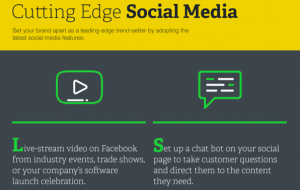
I receive a lot of questions from people who are creating their first social media class or workshop. I have no idea of how many hundreds of hours I have been in front of companies, graduate students, and conferences delivering content to people all over the world but I’ve picked up a few best practices along the way. Here are some tips, tricks, and lessons for delivering a great social media marketing workshop.
Be prepared for different experience levels
The first step is to assess the experience level and expectations of the audience. Are they overwhelmed business people just trying to figure it out? Community managers looking for new ideas and techniques, or experienced CMOs who are ready for something more advanced?
I have three different “core” content sets ready to go at any moment:
- Social media strategy foundations appropriate for small businesses
- Content focused on new ideas, time management and efficiency for people in the trenches
- More advanced ideas focused on cutting edge ideas on strategy, measurement and competitiveness
I can also mix and match content to handle every situation.
It’s also important to be very clear with organizers about any need for special or customized content. I always “tweak content” to appeal to the specific audience but be careful if there is an expectation for something that is highly-customized. It takes me 20 hours of work to develop one hour of new content, so custom can be costly.
Focus on insights, not information
When I started out teaching, I was eager to cram as much information as I could into the allotted time. What a mistake. Students are still people who want a reasonable, interesting, and entertaining experience, so make sure the time is spent on what they need, instead of showing off what you know.
Your job is NOT to simply repeat facts and figures they can find anywhere on the web. Instead, focus on INSIGHTS your guests could not get anywhere else. For each hour of your presentation, focus on diving into 3-5 core ideas instead of providing lists and lists of bullets.
Be memorable through stories
Here is a little experiment I do with my classes. To make a point about storytelling, near the end of the day I ask them to shout out a key learning from the day. Ninety percent of the time it is a phrase or illustration from a story. Rarely to do people cite a number or statistic.
Many people are participating in this social media marketing workshop because they are expected to go back to their workplace and report on what they learned. I guarantee you they will remember and share your stories before they remember a list of stats.
Keep them engaged
Pay attention to how you attend workshops. Even if the content is excellent, people tend to start get distracted and start thinking about home or the office about every seven minutes. Right?
So about every 7-10 minutes, you need an intervention to keep them with you. Here are some ways to shake it up:
- Ask them a question and have them raise their hands or stand up
- Insert an unexpected image in your slide deck
- Change the tone of your voice or body position
- Ask them to turn to a partner and discuss a concept
- Involve them in an exercise
- Change the media type by playing a video
- Tell a joke or spin a story
Manage time like a pro
Your job is to get through all of the lessons you promised to complete. If you are giving a long workshop, maybe 3-4 hours or longer, how do manage that in a reasonable way to adjust for all the bumps along the way? Here are a few tricks to manage the clock:
If you are running too long or too short — I build in “optional” content that I can either use or skip in order to draw it out or squeeze it down. Examples would be a class discussion, a video example, or an exercise. You have to be really careful about this because if people think you are skipping something important they might feel cheated so explain that you had changed your mind about showing some slides because it didn’t make sense for that class.
If you are getting too many questions, it shows you are doing a great job! But sometimes it becomes too much and it jeopardizes the ability to complete your assignment.
At this point, here is what I offer: “I am really energized by these questions and love the discussion, but we are at a point where I am not going to be able to get through the content and my commitment to you is to get through all the content. If I don’t get to your questions, I will stay after class or you can send me an email and I will answer every question you have.”
And while we are on the subject of time management, be mindful of breaks and the biological needs of your audience. Give a break every 90 minutes or so.
What content should you cover?
When I put together a workshop, I brainstorm with the organizers about all the questions their participants could have about the subject matter. Typically it might be stuff like this:
- How do find the time to do this?
- I’m afraid of negative comments on social media
- I feel overwhelmed by all the changes on the social media scene. How do I keep up?
- How do I make money on this stuff?
- How do I measure what we do?
So, start there. Don’t worry about getting into the details of setting up a Twitter page or Facebook account. Those things are easy to learn online. Instead, focus on creating discussions that will provide value when they get back to their home or office.
Handouts and collateral material
Should you have handouts? There are a few possible benefits of collateral materials.
- If you don’t want to provide copies of your slides, a paper summary that people can write on can be useful.
- When you are hired to do a workshop, you’re not expected to “sell” people on other stuff you do. But if you provide a handout, at least they will be walking out with your name and website for later reference.
- A handout can provide bonus material for subjects too detailed and time-consuming for a class. For example, instead of spending hours talking about how to use Twitter, I might hand out copies of my book The Tao of Twitter.
- Some workshop organizers are happy to purchase copies of collateral material as part of the workshop expense.
How much should you charge for a social media marketing workshop?
Of course there’s no cookie-cutter answer to a question like this. It literally depends on so many things including your experience level, the needs of the customers, and the subject matter.
When I develop a quote for a customer I have a base price that is reasonable and affordable but then may add or subtract based on other factors like:
- The amount of custom content needed
- The amount of travel time and days out of the office
- Is it a friend who needs a lower price as a favor?
- Is it a desirable location I want to visit anyway?
- Is the audience likely to connect with me into the future and perhaps hire me?
- Is it part of a conference that provides exceptional networking opportunities?
- Will this lead to more business from the organization into the future?
Well, those are some of my best tips and tricks. What other questions do you have? Please share your questions and comments in the comment section.
Digital & Social Articles on Business 2 Community(35)
Report Post






